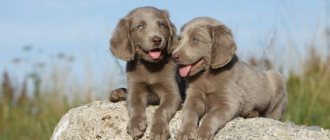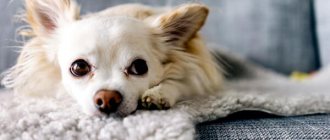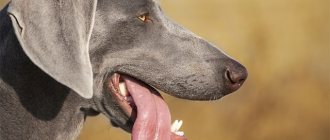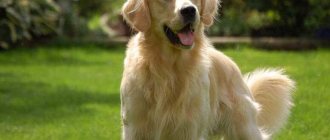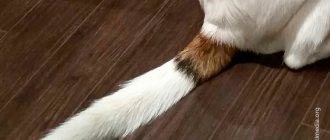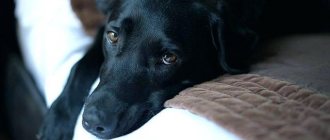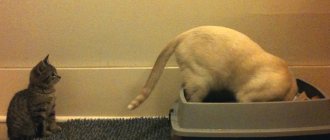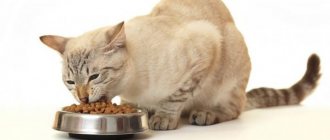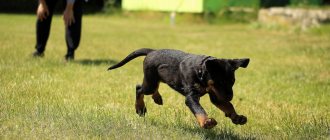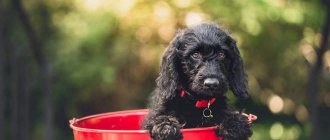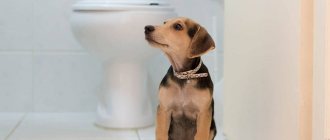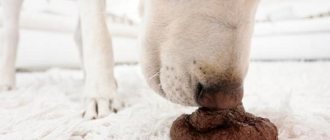Ekaterina Shulga
veterinary therapist
Dog owners often encounter a special tendency in their pets – coprophagia, a passion for eating feces. Representatives of all breeds and ages are confirmed to have this habit. It has been noted that only toy poodles do not suffer from a love of eating feces. In addition to the fact that this is an unpleasant sight, it can lead to serious health problems for the animal. Therefore, it is important to understand why dogs eat poop and eliminate the bad habit.
- How to stop a dog from eating its own poop
Why is coprophagia dangerous in dogs?
Dogs eating feces is a dangerous habit that can lead to infection. The excrement of other animals can contain parasites, viruses and bacteria, so your pet is at risk of contracting the following diseases:
- Parvovirus enteritis
. This pathology is most severe in puppies. As a result of severe diarrhea and constant vomiting, severe dehydration develops, depleting the body.
- Toxoplasmosis
. This disease is equally dangerous for four-legged friends and their owners. Toxoplasma causes a severe blow to the immune system, so it is not always amenable to drug therapy in elderly pets.
- Helminthiasis
. A large ball of helminths is fraught with blockage and rupture of the intestines with subsequent release of the contents into the body. Severe intoxication is fatal.
- Leptospirosis
. The main symptom of Leptospira infection is jaundice. These parasites infect liver cells, causing irreversible pathological changes. Elderly dogs and puppies left without treatment die within the first day.
If you catch your four-legged friend eating other people's feces, try to find out the reason for his perverted preferences. This will help deal with the problem in the future.
Facts about dogs that eat poop
When it occurs in puppies, coprophagia is usually considered part of the process of exploring the world around them. For most puppies, just a sniff is enough, but some will want to, like human children, try everything to their teeth. One strange fact: dogs rarely eat soft, poorly formed stool or diarrhea. They seem to be most attracted to hard stool. In particular, frozen feces are a pleasure to swallow! In his study, Hart made several other observations about why dogs eat feces:
In families with two dogs, coprophagia occurs more often
- Coprophagia is more common in families with multiple dogs. In one-dog homes, only 20 percent of dogs have this habit, while in three-dog homes, the habit is much more common.
- Poop eaters are no more difficult to train than any other dog.
- Females are more likely to eat feces, while unsterilized males are less likely to eat feces.
- 92% of poop eaters want fresh food.
- 85% of poop eaters do not eat their own poop, but prefer the stool of other dogs.
- Greedy dogs that steal food from tables usually eat poop.
Causes of coprophagia in dogs and puppies
For wild dogs, eating feces was an effective way of protecting themselves from predators. Females eating the feces of their puppies destroyed the odorous trail, confusing their pursuers. After domestication, the problem disappeared, and such behavior became unjustified and dangerous.
If a dog eats its own feces, then the reason for its behavior can be explained from a physiological or psychological point of view. Depending on the provoking factor, a veterinarian or animal psychologist may be needed for treatment.
Physiological
Most physiological causes are associated with disorders within the body. These include:
- Parasitosis. Infection with helminths often leads to a perversion of appetite. In addition to excrement, the patient may eat stones, soil and other inedible objects.
- Hunger. If there are long breaks between feedings, the animal may try to kill the worm in any available way.
- Syndrome of impaired absorption in the intestine. This pathology is accompanied by increased gas formation, foul-smelling stools, diarrhea and anemia.
- Hidden infections and gastrointestinal diseases. For this reason, your four-legged pet should first be checked by a veterinarian. Otherwise, weaning from an unpleasant habit may fail.
- Lack of digestive enzymes, vitamins and microelements. The excrement contains beneficial bacteria, so the pet simply replenishes its meager reserves.
If the animal is healthy and well-fed, then the answer will have to be sought in psychology. In the life of a four-legged friend, the attention of the owner plays a huge role, therefore, in its absence, the occurrence of coprophagia is the smallest possible problem.
Psychological
Psychological reasons are directly related to emotions and behavioral characteristics. These include:
- Jealousy
. If a dog is jealous of other pets, he may eat their feces to clear the area of foreign odors.
- Imitation
. After giving birth, the mother is responsible for the hygiene of her babies for a long time. If a puppy eats its own feces, it is simply imitating a more experienced animal.
- Dominant behavior
. Animals that constantly demonstrate their strength and superiority can force other four-legged animals to eat their excrement. Similar behavior from weaker dogs confirms the recognition of the leader.
- Curiosity
. Puppies learn about the world using all their senses. Sometimes they taste completely unexpected things.
- Prolonged stress
. Rare walks are fraught with incontinence. If the owner punishes for leaving piles, then over time the dog will begin to hide the “evidence”.
- Lack of attention
. A pet deprived of the owner’s attention will definitely try to attract him in any possible way. He may begin to damage furniture or bark loudly, disturbing neighbors.
- Competition for food
. A large number of domestic animals is fraught with periodic or constant taking of food. As a result, the dog swallows any stray piece without thinking about the nature of its origin.
Another possible reason is taste preferences. Some four-legged pets are crazy about the excrement of animals of other species, which leads to interspecific coprophagy.
What are the dangers of eating excrement?
Feces are waste products of the body, consisting of undigested food debris, microorganisms, waste, toxins and other metabolic products. Often, feces contain protozoan cysts, parasitic worms, helminth eggs, pathogenic microorganisms and viruses, which, if ingested, can cause dangerous diseases .
Helminthiasis
The most common disease caused by damage to the body by parasitic worms. Helminths in most cases attach to the intestinal wall, but can also affect the liver, bile ducts, muscles, and brain. By parasitizing the dog’s body, worms cause serious damage to his health, which subsequently leads to:
- high susceptibility to bacterial and viral infections
- development of anemia
- allergic reactions
- digestive disorders
- intestinal obstruction, which in turn can lead to death
Parvovirus enteritis
A very dangerous disease characterized by rapid progression and high mortality . When infected with parvovirus, hemorrhagic inflammation of the small intestine and destruction of blood cells-lymphocytes occurs, which is manifested by symptoms in the form of severe weakness, weight loss, dehydration, vomiting, and diarrhea mixed with blood.
Weyl-Vasiliev fever (Leptospirosis)
An acute infectious disease characterized by damage to the nervous system, kidneys, liver, heart and blood vessels. Weyl-Vasiliev fever is manifested by severe intoxication, intense muscle pain, jaundice, convulsions, and low blood pressure.
Toxoplasmosis
A protozoal infection with a variety of course and clinical manifestations. Toxoplasmosis can occur in acute, chronic and latent forms, which greatly complicates diagnosis. Toxoplasmosis can affect almost all body systems: muscular, nervous, respiratory, digestive, cardiovascular.
Why does a dog eat more than just its own poop?
If a dog eats cat feces, it is likely suffering from nutritional deficiencies. Cat feces are enriched with proteins and microelements, so four-legged pets equate it to a real delicacy.
The excrement of herbivores, containing large amounts of fiber, is no less nutritious. Therefore, in rural conditions, you can often see a dog looking for “tidbits” in horse or cow manure.
From a psychological point of view, coprophagia can be explained by a developed territorial instinct, dominant behavior or jealousy. By getting rid of feces, the dog eliminates traces of a competitor or tries to attract the attention of the owner.
General Tips
When teaching an adult dog not to eat feces, owners often make mistakes. And the efforts come to naught. The following recommendations will help you avoid mistakes:
- do not scream, do not hit - such training of a dog is useless, it will aggravate the situation and ruin the relationship, and the intimidated pet will continue the “dirty deeds”, but in secret;
- walk, train and play with the dog every day;
- While the pet is weaning itself from eating feces, a muzzle is put on it during walks;
- if you catch an animal eating feces, do not chase it, do not scold it or coo;
- Don’t poke your muzzle into the piles - the dog won’t understand what’s going on, and its sense of smell will weaken, plus in the future the little tail will get rid of excrement on its own.
Eating feces is an unpleasant habit, but not fatal. With the right approach, it will disappear in 2-3 weeks. If you can’t cope on your own, turn to a dog handler.
How to stop a dog from eating feces: 6 methods
There is no single method that is suitable in all situations. You will have to deal with the situation through trial and error, based on the characteristics of your pet.
Behavior adjustment
It is better to discuss strained relationships between pets with an animal psychologist. You can help yourself only with enough food and daily monitoring during feeding. This will prevent theft from someone else's feeder.
Try to devote more time to your pet. Even a lap dog needs outdoor play. Do not limit communication to stroking and rare trips outside. Try signing up for agility - this sports discipline will bring you closer and make up for the lack of activity.
If you are very busy at work, you can keep your bored pet occupied with interactive toys. Some owners recommend leaving their pets with the TV on.
Start learning the prohibition commands. Using "ugh" and "don't" can easily prevent you from picking up questionable items while walking. At first, distract your pet with a toy and reward him with a treat. The easiest way is to entrust the learning process to a professional dog handler by enrolling in OKD or UGS courses.
Review of diet and vitamin supplements
If your dog eats feces, find out what it is missing. A lack of vitamins during dry feeding is only possible when using cheap economy-class feed. The raw materials of the lowest quality are used in their production. The composition of such feeds is not balanced. Plant components predominate over meat ones, and animal protein is the main source of nutrition for predators.
With natural feeding, vitamin supplementation is a prerequisite for creating a balanced diet. Get tested to understand what substances your pet needs. Based on the test results and medical history, the veterinarian will be able to select a specific drug.
Timely removal of feces
The best way to combat coprophagia is to eliminate provoking factors. Clean up after your pet while out on walks using bags. This helps clean the city and eliminates the possibility of eating fresh feces, which are of much more interest to animals than dried feces.
If a similar situation occurs at home, but the object of unhealthy love turns out to be cat feces, cut off access to it. Close the door to the toilet or other place where the tray is located tightly, not forgetting to make an opening for the cat.
If there are several coprophages, temporarily distribute them in different rooms. This will prevent repetition one after another while correcting behavior.
It will be more difficult with mother-fed puppies. They cannot be separated until the end of feeding, so only timely removal of feces will help here.
Using a muzzle while walking
Always keep your pet on a leash when other people and animals are around you. This is not only good form, but also an excellent way to stop unwanted actions.
Also, do not forget about the muzzle. Representatives of large breeds are difficult to keep even on a leash. Especially if your child goes for a walk with the dog. Buying a muzzle will simplify walking, eliminating the need for constant monitoring.
Screening for diseases
Sign up for an examination at a veterinary clinic to identify possible hidden pathologies or confirm your concerns if you have alarming symptoms. If an illness is detected, the perverted appetite will disappear on its own after recovery.
Use of special drugs
Eating of feces by dogs is prevented not only by taking vitamin and mineral complexes, but also by special preparations that change the taste of feces. They are divided into 2 types. The former are given to the coprophages themselves, and the latter to the animals whose excrement they consume. In addition to creating a bitter taste, the first type of drug helps to compensate for the lack of enzymes inside the body.
If the problem occurs on the street, then it is better to use spray medications. They are sprayed onto any excrement that interests the dog. Once convinced that it is inedible, he quickly loses interest.
